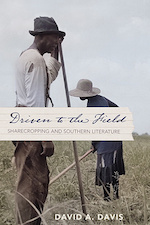Today, we are happy to bring you our conversation with David A. Davis, author of DRIVEN TO THE FIELD: Sharecropping and Southern Literature.
What inspired you to write this book?
Most Americans learn the story of emancipation, but few people learn what happened after slavery ended. I wanted to write about sharecropping, the socioeconomic system that emerged in the South after the Civil War that bridged slavery and freedom by using debt and coercion to tie laborers to crops for a harvest cycle. Sharecropping lasted for nearly a century as the dominant paradigm for agricultural labor in the South, and it affected every aspect of the region’s culture, but few people know about the prevalence of sharecropping or the lives of sharecroppers.
What did you learn and what are you hoping readers will learn from your book?
Readers may be surprised to learn how pervasive sharecropping was in the South. While sharecropping initially developed as a labor arrangement for former slaves, it quickly developed into a multiracial system of labor that affected whites, Blacks, Latinos, and every other ethnic group in the region. In the early twentieth- century, most farmers in the South did not own the land they worked, and in 1930, there were more than five million white sharecropping families and three million Black sharecropping families. This book analyzes the literature of sharecropping to describe how sharecroppers lived, identify the social forces that ensnared them in sharecropping, and explain the enduring significance of sharecropping for the United States.
What surprised you the most in the process of writing your book?
Once I began looking for literary works about sharecropping, I found them everywhere. This book discusses more than a hundred primary sources published over the course of a century. Many of the works that I discuss are mostly forgotten, such as The Store by T. S. Stribling or Cotton by Jack Bethea, but they deserve attention because they illuminate a way of life that affected millions of people. Some of the books I read deserve new attention and consideration. Land Without Moses by Charles Munz is a disturbing depiction of sharecropping as cruel system of exploitation, and it is far superior to Erksine Caldwell’s grotesque portrayals of sharecroppers. ‘Sippi by John Oliver Killens is probably the best novel depicting the civil rights movement in the South, and it eerily predicts the assassination of Martin Luther King.
What’s your favorite anecdote from your book?
William Faulkner’s brother, John, worked for the Works Progress Administration during the Great Depression, and he wrote a novel, Men Working, that satirizes the New Deal. In the 1930s, John was more famous as an author than William, who published most of his great works during the Great Depression but struggled to find appreciative audiences until after World War II.
What’s next?
I am editing a collection of essays on cotton and the modern South and writing a book about food as a form of social control and personal resistance in southern literature from slave rations to food stamps.





